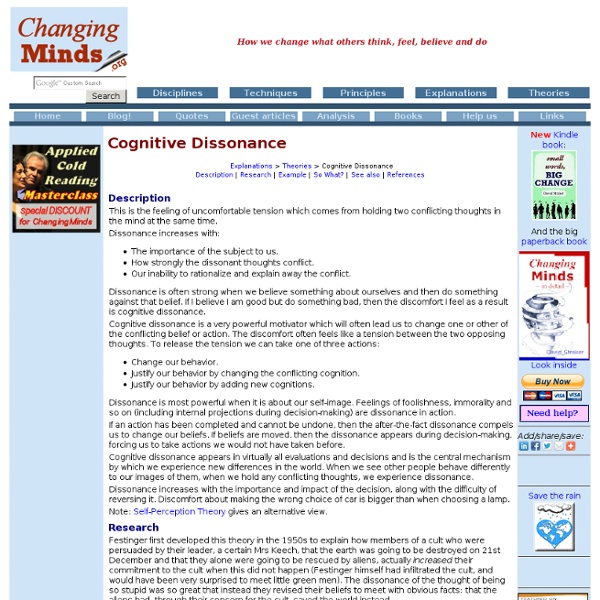Cognitive dissonance
In psychology, cognitive dissonance is the mental stress or discomfort experienced by an individual who holds two or more contradictory beliefs, ideas, or values at the same time, or is confronted by new information that conflicts with existing beliefs, ideas, or values.[1][2] Leon Festinger's theory of cognitive dissonance focuses on how humans strive for internal consistency. When inconsistency (dissonance) is experienced, individuals tend to become psychologically uncomfortable and they are motivated to attempt to reduce this dissonance, as well as actively avoiding situations and information which are likely to increase it.[1] Relationship between cognitions[edit] Individuals can adjust their attitudes or actions in various ways. Consonant relationship – Two cognitions/actions that are consistent with one another (e.g., not wanting to get intoxicated while out, then ordering water instead of alcohol) Magnitude of dissonance[edit] Reducing[edit] Theory and research[edit] Examples[edit] E.
Personal Mythology
The Five Stages of Personal Myth-Making The natural five-stage sequence around which the tasks and activities of the personal mythology model are organized can be easily summarized: 1. 2. 3. 4. 5. At any point in your life, any of your guiding myths may be going through any of these stages of mythic transformation.
Personality disorders
A personality disorder is a type of mental disorder in which you have a rigid and unhealthy pattern of thinking, functioning and behaving. A person with a personality disorder has trouble perceiving and relating to situations and to people. This causes significant problems and limitations in relationships, social encounters, work and school. In some cases, you may not realize that you have a personality disorder because your way of thinking and behaving seems natural to you. And you may blame others for the challenges you face. Personality disorders usually begin in the teenage years or early adulthood. SymptomsJan. 31, 2014 References Personality disorders.
s Blog » Blog Archive » A Mission Statement for your life
When you discover your mission, you will feel its demand. It will fill you with enthusiasm and a burning desire to get to work on it.W. Clement Stone Inspired by Alex Shalman and his article The Socratic Method To Great Living (5 Simple Steps) I’ve written down what I consider to be the essence of me. 1. 2. 3. 4. 5. Mine are not about the perfect me but what I need to remember on a day to day basis. I find great journaling prompts in most articles I read these days, and I take notes obsessively whenever I find interesting information or factoids about anything. Alex also writes that it’s important to know your limitations. One of the words to photograph for the Diptych Project was “calling”. I’m thinking mine is yet to figure out, but it will be something that includes 1) writing 2) creativity 3) inspiring others with art, photography, words; much like I do with this blog I guess… Here is the spread where I wrote the answer down; This is the whole spread from my portion control play.
Cognitive Dissonance and learning
Cognitive dissonance is a psychological phenomenon which refers to the discomfort felt at a discrepancy between what you already know or believe, and new information or interpretation. It therefore occurs when there is a need to accommodate new ideas, and it may be necessary for it to develop so that we become "open" to them. Neighbour (1992) makes the generation of appropriate dissonance into a major feature of tutorial (and other) teaching: he shows how to drive this kind of intellectual wedge between learners' current beliefs and "reality". Beyond this benign if uncomfortable aspect, however, dissonance can go "over the top", leading to two interesting side-effects for learning: if someone is called upon to learn something which contradicts what they already think they know — particularly if they are committed to that prior knowledge — they are likely to resist the new learning. On cognitive dissonance and sour grapes On application of the theory to Aids
Fowler Stages of Faith
From Joann Wolski Conn (ed.), Women’s Spirituality: Resources for Christian Development. (Paulist, 1986), pp. 226-232. Stages of Faith James Fowler Stage I Intuitive-Projective faith is the fantasy-filled, imitative phase in which the child can be powerfully and permanently influenced by examples, moods, actions and stories of the visible faith of primally related adults. The stage most typical of the child of three to seven, it is marked by a relative fluidity of thought patterns. The gift or emergent strength of this stage is the birth of imagination, the ability to unify and grasp the experience-world in powerful images and as presented in stories that register the child's intuitive understandings and feelings toward the ultimate conditions of existence. The main factor precipitating transition to the next stage is the emergence of concrete operational thinking. In Stage 3 Synthetic-Conventional faith, a person's experience of the world now extends beyond the family.
:: Authentic Happiness :: Using the new Positive Psychology
Theories of The Deep Understanding of Things
Art & Language. Sea Ghost II. 2014. Acrylic with ink and mixed media on canvas. 176 x 149.5 cm. "If they play “My Way” at your funeral, you were probably kind of an asshole."



